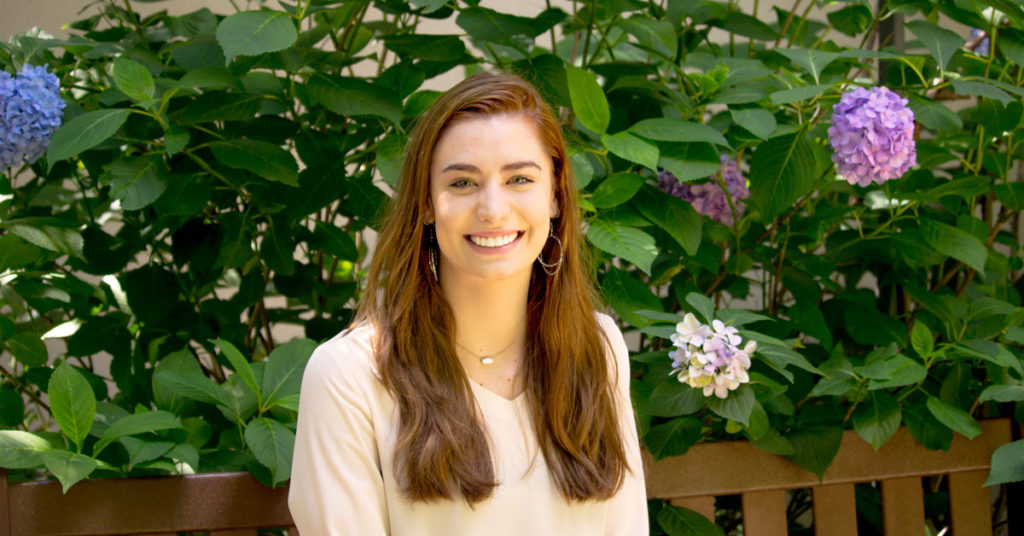Bryn
Recovery is a lifestyle.

‘Let me just tell you that I was a mess before Skyland. I wasn’t doing great in relationships with friends, family, or really anyone. I was extremely depressed, overworking myself with two part-time jobs and school. I was constantly debating suicide and looking for outside validation in a number of unhealthy ways. I was in really terrible shape.
I came to Skyland because it was my parents’ last resort to get me the help I needed—essentially the depressed people boot camp. I came in refusing to go on a tour, crying, and just not wanting to be here at all. I went into Rollins with my happy face on—or my mask as one therapist would call it—and I was convinced I would BS my way through treatment. This is just hippie crap. All we do is talk about feelings and trauma. My mind was basically saying that this isn’t me. I went to all of these classes and community meetings where people said it changed them. I challenged them. I said, ‘Oh sure you can try that.’
It took a past client giving me a list that I thought was irrelevant that ended up starting my journey.
It was ‘The Five Things To Do If You Don’t Want Treatment.’
- You have to focus on the discharge date. You repeat in your mind that 90 days isn’t that big of a deal. 90 days to make someone else happy.
- You have to analyze, revise, and improve the treatment plan, which I often tried to do thinking I knew better than professionals.
- You have to focus on the faults of the staff, and make sure they know that they are humans too.
- You have to concentrate on physical problems or unsolved issues at home. A lot of the drama you come in with you must be kept in you. Make sure you’re focusing all of your attention and time on it.
- You really don’t want treatment. You do not surrender.
Surrender is the word that stuck out to me. Surrendering sounds like you’re giving up. That you’re giving up all hope. And really you’re giving up control. At the end of reading this I felt called out. I remember sitting there thinking, ‘They can’t read my thoughts. They have no idea that secretly I’m thinking about packing up and leaving. They don’t know that I’m going to go back to exactly what I was doing before as soon as I leave these doors.’
It basically took everything in me to surrender. It took me two months to open up to my primary counselor. And it took family therapy to keep me in treatment. I was hard-headed. I thought I knew what was best.
News Flash: I didn’t.
It sucked to admit I needed help, and that I couldn’t do everything myself. It sucked to admit that it was better for me to have someone else direct my life for three months. I needed this kick in the pants more than I ever knew. None of us come to Skyland because we’re so healthy and functioning so well in life. Coming out of here we aren’t done with treatment either. The scary part is treatment is therapy appointments and skills and meds and constant reminders that we need help. Those don’t go away after three months. Recovery is a lifestyle. That’s why sober addicts are still considered addicts. We are constantly at risk of relapse. Whatever your addiction or diagnosis, I promise that if you commit to going through and getting better, you’ll go through hell and come out a better person.’
Financial aid paved the way for me to get the help I needed.
That was my speech that I gave in Community Meeting at my graduation from Skyland. A big part that I didn’t include was the fact that financial aid is really what kept me here. After around 30 days, my insurance didn’t help anymore. They wouldn’t cover for longer than a month. That’s when a lot of my therapy really started. You’re still in denial for a large portion of when you’re here. A lot of people come in undiagnosed as I did. I’ve since been diagnosed with Borderline Personality Disorder.
To me, medicine has never been an answer. I’ve had a lot of addiction issues in my family’s past, so I’ve always thought of it as a very negative. All the previous medications I’ve tried were what I call ‘side effects in a bottle.’ Coming in and talking to the staff and realizing that this was so much more, took more than 30 days. Financial aid paved the way for me to get the help I needed.
A lot of people come in and this is one of their last resorts. They come in with medical bills because we’ve all had suicide attempts; we’ve all had something in our past. This isn’t normally your first option. It causes a lot of us to think that hopefully Skyland is the answer.
And for a lot of us, it is.
